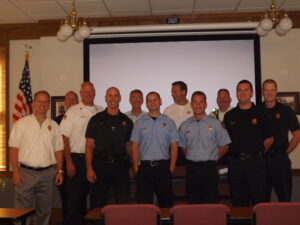Bringing awareness of “Behavioral Health in the Fire Service”

Photo by Kathryn Menue: Chicago Battalion Chief Daniel DeGryse (far left) spoke to the Belvidere Fire Department about behavioral health in the fire service on Friday, Sept. 25.
By Kathryn Menue
Editor
BELVIDERE – Military personnel, police officers, firefighters, and paramedics often respond to traumatic incidents in the line of duty.
After experiencing side effects from the trauma they have responded to, the military service men and women returning from war receive assistance from the Veterans Administration.
Likewise, police officers have mental health service options readily available to them through the police department, if need be. However, the same cannot be said for a substantial amount of fire departments across the U.S.
Chicago Battalion Chief Daniel (Dan) DeGryse is striving to establish behavioral health services in the fire service.
DeGryse has been with the Chicago Fire Department for 26 years and within the last couple of years in Chicago, he, along with other concerned parties, has established the Florian Program with Rosecrance, which is an eight-bed unit specifically designed as a behavioral health resource for firefighters and paramedics.
“I’d worked as an EAP [Employee Assistance Program] for 14 years and seen so much go on with our members. I wanted to find resources [to help],” DeGryse said.
DeGryse would like to spread behavioral health opportunities for firefighters outside of Chicago as well. To do so, DeGryse travels to other fire departments to educate them on behavioral health.
On Friday, Sept. 25, DeGryse presented his lecture, “Behavioral Health in the Fire Service,” to the Belvidere Fire Department.
In his lecture, DeGryse began with the need to spread awareness of behavioral health not only within the fire department, but to the general public as well. A good portion of the population sees firefighters as having a heroic and glorified position in society. In retrospect, firefighters are exposed to traumatic occurrences and health risks just like police officers and other first responders.
However, the lack of behavioral health for fire service men and women still isn’t out there. So, DeGryse decided to study firefighters and gain some perspective on the health issues and potential risks firefighters may face in and after the line-of-duty.
DeGryse found that firefighters have one of the most stressful occupations due to the fact that when they respond to a call of action, their bodies signal an adrenaline rush which triggers a high amount of cortisol to kick into their bodies. Cortisol “puts the body on high alert” and “heightens awareness.”
Cortisol is good for firefighters responding to a situation so they are fully aware of their surroundings to facilitate the task at hand. Unfortunately, when cortisol is over-triggered, it can create health problems such as “adrenal fatigue, heart problems, sleep disorders, weight gain, memory loss, concentration issues, high blood pressure, skin conditions or flare-ups (eczema), anxiety, and depression.
These problematic side effects, such as depression, can lead to suicidal tendencies.
For example, too much cortisol destroys brain cells which can affect mood and cause psychological issues like depression, which can lead to suicide.
DeGryse said that suicide comes from the “effects of life in general and the effects of the body on the mind.”
Firefighters, like anyone else, face the stressors of everyday life, but they also face internal stressors from their line of work. When those stressors are mixed together, it puts firefighters at a higher risk for mental illness and suicide.
The increasing suicide rate is what led DeGryse to advocate for behavioral health services for the fire departments.
“The suicides really bothered me,” DeGryse said. “I thought ‘we’ve got to do something to address this.’”
DeGryse had a reason to be concerned since in an 18 month period through 2008 and 2009 in his district, there were seven suicides and two attempts. In 2010, it escalated to four suicides in five months.
“They were determined to end the pain,” DeGryse said.
Fortunately, DeGryse said that firefighters can make some lifestyle changes to help prevent more suicides from occurring.
If their behavioral or mental health problems stem from cortisol deficiencies, firefighters can incorporate more physical activity, nutrition, relaxation techniques, social connectivity and laughter, and regular doctors’ visits into their lives.
Firefighters should also take about a 20 minute period to decompress when they get home so that they are not bringing the stressors of work home with them every day.
DeGryse advocates that some of the best options the fire service can adopt in each department are behavioral health training sessions, exit interviews for retirees, and peer support groups, like the Rosecrance Florian Program in Chicago.
DeGryse is spreading the word about creating these programs in other fire departments so that firefighters can seek the help they need, in a place they can trust, with supportive individuals who understand their situation. A place where they “won’t lose their job and they won’t be judged.”
DeGryse and others created the Rosecrance Florian Program in Chicago where firefighters and paramedics can come meet with him, or a chaplain, or even a peer support group to seek help about stress, disease, drug and alcohol abuse, PTSD, mental health issues, family relations, suicide, and even dealing with retirement.
DeGryse said that when they “meet with a chaplain or me and feel support, you can see their walls come down, which leads to better treatment.”
DeGryse wants these supportive opportunities in fire departments all across America so that the suicide rates can go down and firefighters can receive the help they need after giving so much to their communities.


